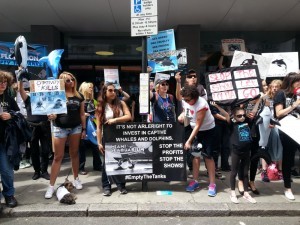To mark the 3rd annual Empty the Tanks event on Saturday 6 June 2015 which saw over 70 rallies in 20 countries against cetacean captivity, Earthrace Conservation UK reveals that whilst the UK no longer has captive whales and dolphins, there are still plenty of British links to the captivity business.
IT’S NOT ARLERIGHT Arle Capital Partners Ltd, a British private equity firm managing €2bn of investments for its investor base, owns Parques Reunidos which bought the Miami Seaquarium in the USA in July 2014. The Miami Seaquarium is home to numerous captive dolphins as well as orca Lolita, who was taken from the wild in Puget Sound in 1970 and has lived alone in captivity ever since.
Parques Reunidos also runs Sea Life Park, Hawaii (captive dolphins), Marineland Antibes, France (captive dolphins and orca), Selwo Marina Delphinarium, Malaga, Spain (captive dolphins), and Mar del Plata Aquarium, Buenos Aires, Argentina (captive dolphins and orca).
SEA LIES Sea Life’s parent company, British-owned Merlin Entertainment, has since 2006, purchased at least three attractions which house captive cetaceans. The most recent purchase in 2012 was Chang Feng Ocean World in China which has been rebranded as a Sea Life centre.
Despite Sea Life proclaiming that, “Sea Life believes it is wrong to keep whales and dolphins in captivity. No matter how spacious, no captive facility can ever provide such far-ranging, highly social and highly intelligent animals with the stimulation they need for a good quality of life”, three wild caught beluga whales are still performing daily in the Shanghai centre.
Merlin itself is part-owned by the Blackstone Group (34%), the same company which bought all the USA Sea World marine parks in 2009.
DON’T BUY A TICKET Thousands of British travel agents continue to promote trips to millions of British holiday makers that include visits to marine parks, and millions of Brits still pay for tickets to see performing whales and dolphins in marine parks all over the world.
Some ethical travel companies, such as Responsibletravel.com, actively campaign to encourage their industry counterparts to stop interactions with marine parks but the enormous profits on offer mean it often falls on deaf ears.
Despite Richard Branson’s purported stance against cetacean captivity, Virgin Holidays continues to exploit captive whales and dolphins for profit albeit with the proviso from Branson that he won’t work with marine parks that haven’t pledged never to take receipt of cetacean including whales and dolphins that were taken from the wild after 14 February 2014.
Almost all of the 38 marine parks that have signed the Virgin pledge to date (and which Virgin Holiday therefore continues to do business with) hold at least some wild caught cetaceans even if taken prior to the stated date. Among them are Mirage Dolphin Habitat, Las Vegas where captive dolphins are kept outside in full sun that often reaches 100oF, and Loro Parque in Tenerife, where ‘rescued’ orca Morgan has been the subject of an on-going court battle attempt to get him released back to the wild.
UK LEGISLATION There is no current legislation that would prevent a company from applying to open a dolphinarium or captive whale facility in the UK. There are regulations that would govern the size of the tanks and the costs would be considerable (as would opposition). However, it could be done and the vast profits made by the big players mean it would be affordable. Doubtless plans would be helped along by the three tory backbenchers who recently blocked the proposed bill that would have banned the use of wild animals in circuses.
Earthrace Conservation organised three events for Empty the Tanks this year, in London, Manchester and Buenos Aires.
Beverley Bailey from Earthrace UK, said: “As we no longer have dolphins and whales on show here, people in Britain may think cetacean captivity has nothing to do with them. Shamefully however, there are plenty of links between British companies and the captivity business in addition to the millions raised from Brits buying tickets to the shows.
“In comparison to seeing a captive whale or dolphin through glass, in a tank or in a sea pen, an encounter with a wild cetacean while on a whale or dolphin watching trip is a breathtaking and more importantly, safe, kind and ecologically-sound experience. It is the only way in which a human should be allowed to view a whale or dolphin.
“It is the whale and dolphin watching companies that we should all be supporting whether as a holiday maker or an investor, not the greedy marine parks and associated companies, including those in Britain, that only care about their profits”.
Notes:
Empty the Tanks Worldwide was founded by Rachel Carbary after witnessing the horrific dolphin slaughters that occur annually in Taiji, Japan. Rachel is a US-based animal activist who aims to educate people about various animal rights issues.
Empty the Tanks is a campaign aimed at educating the general public about what captivity means to cetaceans. This annual event allows activists to reach the public all over the world in a positive and productive way. 2015 ETT locations included the USA, UK, South Africa, South America, Turkey, Mexico, Dubai, France, Germany, Portugal, Italy, Hawaii and Spain.
Photo: Protestors outside Arle Capital in London, 6 June 2015 Credit: earthrace UK
EMPTY THE TANKS 2016 will be held on Saturday, 7 May 2016.
